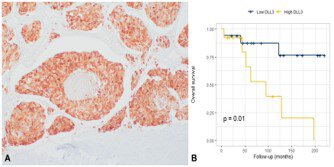Ruz-Caracuel I, Caniego-Casas T, Alonso-Gordoa T, Carretero-Barrio I, Ariño-Palao C, Santón A, Rosas M, Pian H, Molina-Cerrillo J, Luengo P, Palacios J. Transcriptomic Differences in Medullary Thyroid Carcinoma According to Grade
Endocr Pathol. 2024
"Our description of the overexpression of DLL3 in this tumor, could pave the way to apply new personalized treatments in the most aggressive subtype of medullary thyroid carcinoma" . - Ignacio Ruz Caracuel
Summary:
Medullary thyroid carcinoma (MTC) is a rare cancer derived from neuroendocrine C-cells of the thyroid. Transcriptomic analysis was conducted on 21 MTCs, using the NanoString Tumor Signaling 360 Panel. This analysis, covering 760 genes, revealed upregulation of several genes in high-grade MTCs. Major pathways differentially expressed between high-grade and low-grade MTCs were DNA damage repair, p53 signaling, cell cycle, apoptosis, and Myc signaling. Validation through qRT-PCR in 30 MTCs demonstrated upregulation of ASCL1, DLL3, and SOX2 in high-grade MTCs, a gene signature akin to small-cell lung carcinoma, molecular subgroup A. Subsequently, DLL3 expression was validated by immunohistochemistry.
MTCs with DLL3 overexpression were associated with significantly lower disease-free survival and overall survival. Moreover, MTCs with desmoplasia had a significantly increased expression of DLL3. Our data supports the idea that DLL3 should be further explored as a predictor of aggressive disease and poor outcomes in MTC.
Why do you highlight this publication?
This work represents a major advance in the molecular understanding of a rare tumor such as medullary thyroid carcinomas. We show for the first time transcriptomic differences between low-grade and high-grade medullary carcinomas, two groups of tumors with different prognosis. In particular, we have identified that high-grade medullary carcinomas have a tendency to overexpress the protein DLL3, a drug target in clinical trials.
This work has been entirely funded by an intramural grant from the IRYCIS.
Publication commented by:
Dr. Ignacio Ruz Caracuel
Pathology Department
MOLECULAR PATHOLOGY OF CANCER GROUP-IRYCIS



